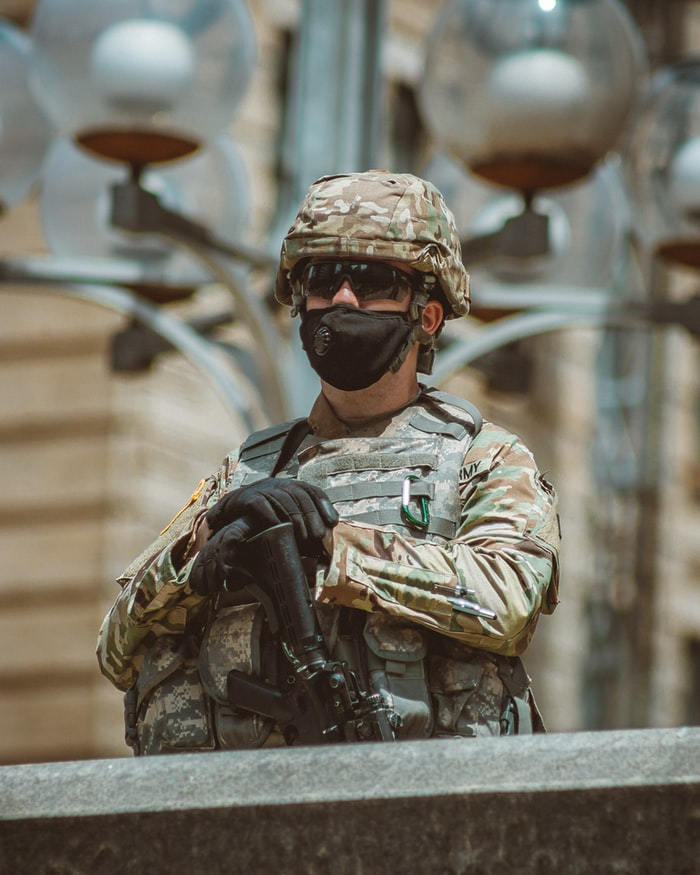This hot take is written as part of the Virtual Workshop Cycle on Building Capacity in the Age of COVID-19. The second workshop focused on counterinsurgency and counterterrorism, and involved Major-General Jennie Carignan, Commander of the NATO Mission in Iraq, Dr. Bruno Charbonneau, professor at the Royal Military College Saint-Jean, Dr. Louis-Alexandre Berg, professor at Georgia State University and Dr. Marc-André Boisvert, independent researcher on the Sahelian armies. The information reported in the text is a general synthesis of the ideas presented by the speakers.[1]
How has the current COVID-19 pandemic influenced capacity building in the areas of counterinsurgency and counterterrorism? Many international observers initially seemed to see the health situation as a pivotal moment for operations carried out by conventional state forces in the Middle East (Iraq, Syria) or the Sahel (Mali, Burkina Faso). On the one hand, affecting primarily the most underprivileged segments of the population, the health crisis significantly worsened social tensions in countries receiving international assistance. On the other hand, faced with significant logistical constraints to protect their personnel, the majority of international donors highly involved in these geographic spaces were reducing their immediate operational activities and putting their military training activities on hold. In this context, it was foreshadowed a renewed engagement on the part of the various armed groups. They could indeed take advantage of the growing operational “vacuum” and the loss of legitimacy of state authorities to regain ground and influence with civilian populations.
In practice, however, these predictions have hardly been verified in the field; insurgent groups have not shown any real resurgence in their activities vis-à-vis local state authorities. Certain international actors involved in security operations – such as NATO in Iraq – have certainly drastically reduced their activities, but local armies have so far effectively taken over in terms of operational presence. The Iraqi security forces, for example, quickly adapted to the pandemic context, and made it possible to avoid a disruption of presence in contested geographical areas.
While the COVID-19 pandemic has not drastically altered the immediate balance of power on the ground between insurgents and counterinsurgents, it still seems to place a salient paradox of capacity building activities at the center of the debate in terms of counter-insurgency and counter-terrorism: the permanent search for international donors to find a compromise between short-term operational investments to support local armies in the face of imminent threats and medium and long-term strengthening of the material and organizational capacity of local armies to face threats heard more broadly. Indeed, the redefinition of the strategic objectives in times of pandemic of the main donors (the United States, Canada, European Union, etc.), and the budgetary reorganizations that are likely to result from them will certainly alter the priorities of these actors. The main providers of capacity building operations are likely to prioritize tangible and easily quantifiable aspects of security assistance (provision of military equipment or dispatch of military trainers) at the expense of less tangible, but essential activities; the development of the legal responsibility of local armies, respect for human rights and the general fight against corruption and the politicization of the security forces.
While the majority of “security crises” in Africa and the Middle East are above all crises of democratic governance, as evidenced by the recent coup d’état in Mali in August 2020, this redefinition of priorities risks being highly criticized as counterproductive. After the notorious failures in Afghanistan and Iraq, counterinsurgency and counterterrorism operations cannot be considered “panaceas,” and it is now essential that donors move away from purely security-based solutions that have prevailed in the past. These actors must try to act in concert with multilateral entities (the United Nations in particular) to redirect the resources invested towards capacity building programs not only military, but also civilian. This must notably go through the construction of interpersonal relationships of trust with local institutional actors.
A central issue that should undoubtedly be better addressed by international donors is assessing the overall effectiveness of their capacity building operations. What indicators do they want to prioritize to assess the strengthening of local structures? Do they want to focus on the security situation and see a certain success in a single “negative” peace? On the contrary, do they want to put at the heart of the assessment the strengthening of the standard of living of the local populations, with the more ambitious objective of promoting the development of a real so-called “positive” peace? Investments made in the past have rarely been followed by a real assessment of their influence, in particular to ensure that they are actually translated into the provision of essential services for the civilian population. Better monitoring of the operations carried out is crucial to prevent insurgency organizations from taking advantage of any institutional gaps to develop their own counter-models of governance. It is also decisive in a context of growing geopolitical competition, where several poles of influence – the United States, Europe, Russia or China – compete to provide their own security assistance.
If they must rethink the direction and monitoring of their capacity building actions, international donors must ultimately avoid copying exogenous strategic priorities to political spaces with decisive local characteristics. Reflection on the place of the army within institutional structures, for example, can only be carried out locally and correspond to the threats, dilemmas and historical specificities specific to each space. The strengthening of the legitimacy of local armies can only be done by a genuinely political reappropriation of the issue of security, through the development of real mechanisms for civilian control of military authorities. If institutional security cannot be built at the expense of human security, the question that becomes essential to answer for many countries in crisis is: how do we create more democratic security?
[1] However, the ideas presented are those of its author.





Comments are closed.